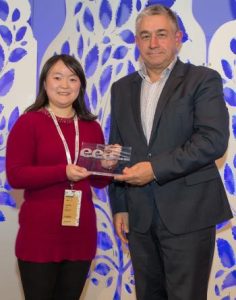
Tiantian Xiao
“At this stage, I am trying to be involved in the electricity supply industry as much as possible. I am looking forward to sharing my learnings on Underground Distribution Pillars and distribution ferro-resonance.”
How would you introduce yourself in one sentence?
I am a 3rd professional year (Year 4) Electrical and Electronic Engineering student at the University of Canterbury. I enjoy learning new concepts and applying skills and knowledge to tackle challenging problems.
Why did you choose to study electrical engineering?
I was very passionate about calculus and physics in high school and did particularly well in an electricity paper. After finishing high school, I completed a year in Health Science at the University of Otago, to explore my options. At the end of the Health Science programme, I realised that I really missed physics and solving problems. So after seeking advice from my family, I decided to change my degree and study engineering. With my background in Health Science, I was able to enter the 1st professional year (Year 2) of engineering. I decided to study electrical engineering as most of my family members worked at power generation sites in China.
At the University of Canterbury, I have been amazed by the electric power system as it uses basic principles for many different complex applications. I have learnt more about electrical systems in New Zealand as well as about different sections of the electric power system, from generation to distribution, from measuring equipment to control. The courses offered at the university are interesting, although challenging. I really like learning new things about electricity and find alternative solutions to problems.
In which projects have you been involved in and outside of university? What challenges and opportunities did you encounter?
At university, we have completed a range of projects, such as a load flow and fault analysis case study for the South Island Grid using Load Flow Harmonic (LFH). We had to design the South Island Grid to meet higher power demand. There are many options to fix overloading issues but choosing the best option is sometimes not so easy. This project provided a good opportunity to better understand power systems. For my final year project, I am working on ferro-resonance in distribution systems. As more underground cables are introduced into the network, the capacitance will interference with non-linear inductance from distribution transformers and cause over-voltages.
Outside of university, I have been involved in a thermal analysis project for underground distribution pillars (UDP) with Hamer Limited. Underground electrical equipment is always associated with thermal concerns. In this project, we investigated the possible causes of heat accumulation and made some recommendations to avoid heating problems. We are looking forward to sharing our learnings at APEX. I have also had the opportunity to be involved in a number of projects with Meridian Energy. One of the most challenging projects was to investigate generator conditions and the factors causing uneven wearing of the generators.

Tiantian receiving her Scholarship plaque from Bob Taylor, EEA President
How would you like to contribute to the electricity supply industry in the future?
At this stage, I am trying to be involved in the electricity supply industry as much as possible. I am looking forward to sharing my learnings on Underground Distribution Pillars and distribution ferro-resonance. As I am only in my 3rd professional year (Year 4), I still have limited experience and knowledge of power engineering and I am looking forward to discovering a lot of new and interesting things in this field.
What is the most important piece of advice you would give to high school students wanting to start a degree in engineering? And to university students wanting to specialise in power engineering?
As a power engineering student, I can only recommend high school students to start a degree in power engineering. The academic staff in power engineering are very supportive and EPECentre is there to provide guidance to the students.
For school leavers, I would recommend to give engineering a go, as I am sure they will find a lot of interesting things in the power industry. I would also encourage them to go on the Power Field Trip organised by EPECentre every year, so that they can have a better idea of what it means to work in the power industry.

